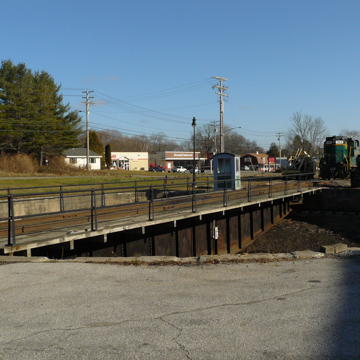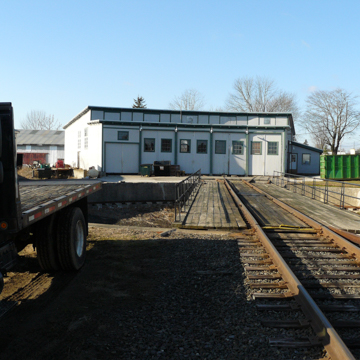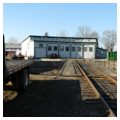This turntable, built by the Maine Central Railroad in 1921, is the only surviving vestige of a transportation era when railroads comprised a vital component of Maine’s fishing, lumber, lime, and tourist economy. Built to replace a former turntable erected by the Knox and Lincoln Railroad in 1871, it resides about a half mile from the Rockland Railroad Station (1917), which has since been converted into the town’s city hall.
The Rockland Turntable and Engine House complex consists of a five-bay, wooden frame engine house, and a concrete and steel turntable located just south of Park Street (US 1) and west of Rockland’s business district. Four of the five entry bays feature track-mounted doors. The engine house has clapboard siding and rests on a concrete foundation. The front of the building is a single story while the rear consists of two stories, with monitor windows in the elevated roof that overlook the front. One hundred feet east of the engine house is the fifty-foot diameter turntable. The steel deck is mounted on a center pier and covered with wood decking. At the western end is the operator’s house. The table turns on a steel rail that is attached to the concrete retaining wall. The construction date is stamped into the north side of the concrete wall.
Rockland’s shipbuilding, lime-burning, and fishing industry thrived in the mid-nineteenth century. The home of the majestic clipper ship, Red Jacket (the fastest clipper ship in 1853), Rockland was also a major producer of lime and host to a large fishing fleet and numerous canneries. Given this activity, Rockland needed expanded market access. In 1870 the Knox and Lincoln Railroad connected Rockland’s deep water port and its brisk commerce and industry to Portland, Canada, Chicago, and beyond.
In 1890 the Maine Central Railroad leased the Knox and Lincoln line (it acquired the line in 1901), and ultimately replaced the original turntable with the present one. During the 1950s Maine’s consolidated railroad lines, the Boston and Maine and the Maine Central, steadily lost revenue as automobile travel and the trucking and airline industries grew. In 1960 the Boston and Maine terminated all service to Maine, and the Maine Central drastically reduced service. The Maine Central abandoned its rail service to Rockland in 1959.
The tracks remain in place between the turntable and the engine house. The Maine Eastern continues to use the turntable to operate scenic train rides for tourists between Brunswick, Wiscasset, and Rockland.
References
Mahoney, Kirk F., “Rockland Turntable and Engine House,” Knox County, Maine, 1990. National Register of Historic Places Inventory-Nomination Form. National Park Service, U.S. Department of Interior, Washington, D.C.
Rockland Bicentennial Commission. An Informal History of Rockland, Maine.Rockland: Bicentennial Commission, 1976.



















